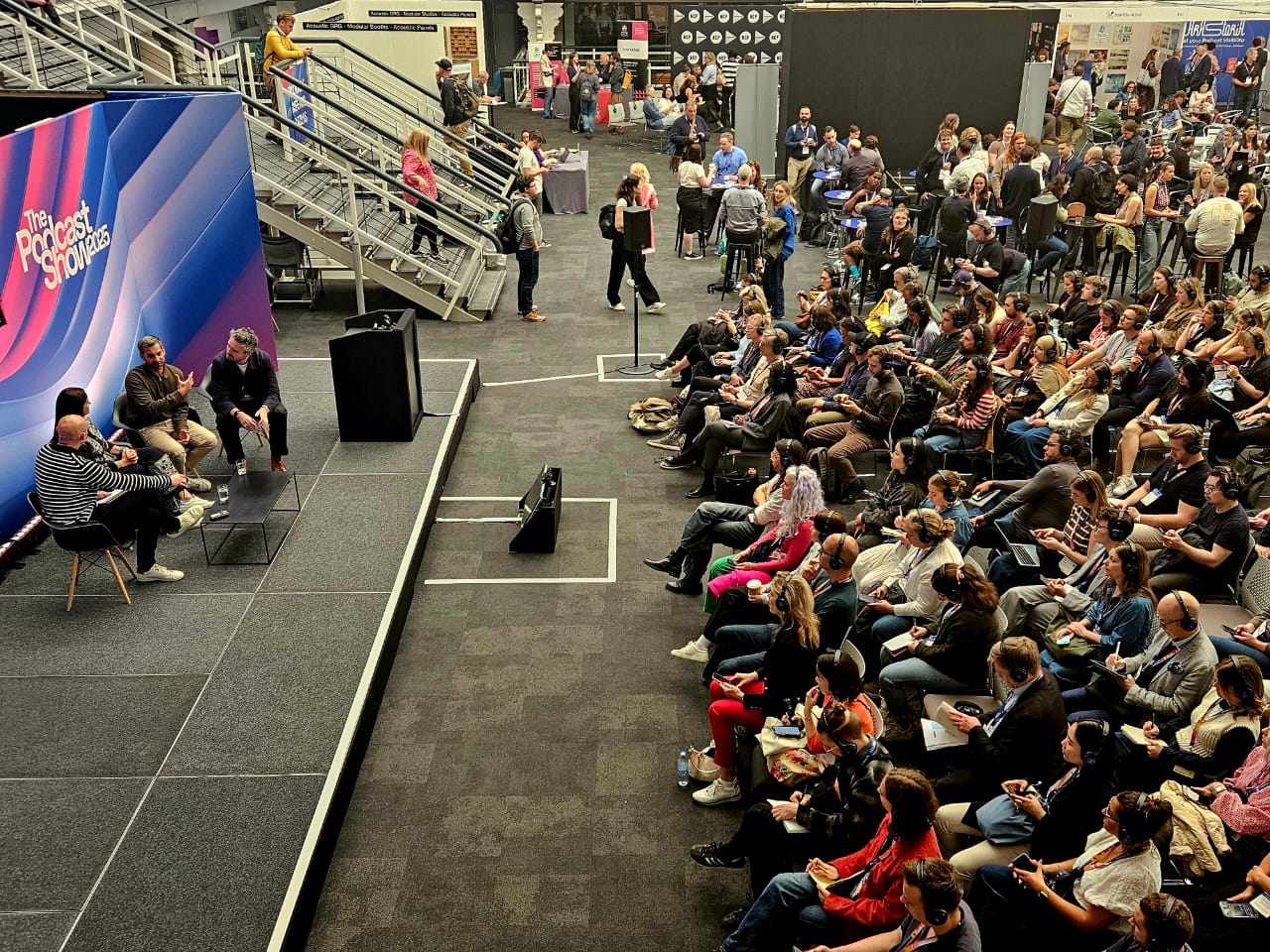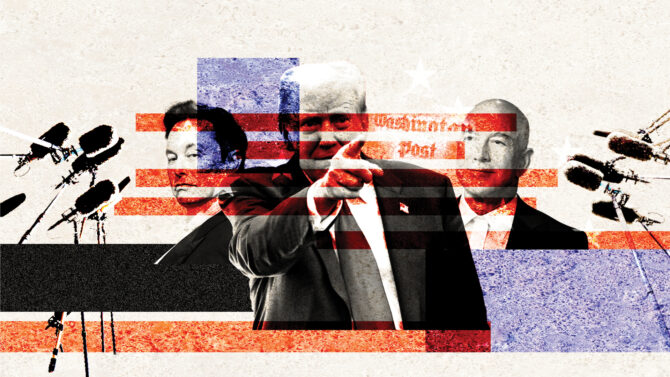Everything we saw and heard at one of the audio industry’s biggest gatherings (and beyond) in London.
Podcasts? Sure –everyone seems to have one these days: journalists, comedians, actors, professors, celebrities, and influencers of every kind. But is the much-hyped “shift to audio” still an innovation, or has it become a fading fad?
At the Islington Business Centre in London, where this year’s The Podcast Show took place over two days (21–22 May), there was little doubt among attendees. They had answers. After booming during lockdown, podcasts have now entered a phase of maturity and expansion. They’re diversifying, evolving into hybrid formats, and integrating with new media across multiple platforms.
Professionals from over 40 countries—from Malaysia to Australia and both sides of the Atlantic—gathered with representatives from major production studios, top media outlets, content creators, marketeers, advertisers, and brands supplying hardware to the audio and visual production industry. They traded insights and business cards, celebrated the most creative presentations, and explored predictions about the future of the ever-evolving audiovisual world.
Here are 10 things we learned…
“The article will die, but storytelling will not”: Notes from the Nordic AI in Media Summit

Scandinavian newsrooms are leading the way in adopting TN, creating tools for news production while challenging their dependence on American technology.
“Sure, 2025 is the year of video, but let’s not forget that podcasts are there as entertainment for your ears while your eyes are busy.”
The audio-versus-video debate was the big topic of discussion. One way or another, it came up in most panels and sessions: do we listen to podcasts, or do we watch them now? The industry’s “audio gatekeepers” like James Cridland of the influential newsletter Podnews—who opened the event with a review of the past year (and who made the comment quoted above)—pushed back against the growing obsession with video (despite 1 billion podcast plays on YouTube). Although…
“When we treat podcasts as ‘just sound,’ we completely miss the point.”
That was the argument presented in a very interesting—and at times provocative—presentation by Lily Taurau and Polyanna Ward of FlightStory Studio. Their point? Podcasts have moved from audio apps to YouTube (84% of Gen Z prefers to “watch” them), and from there into the smart TVs in our homes (45% of podcasts are consumed via television). So, they asked—capturing the attention of the marketeers in the room—why stay in a $4 billion market (the current estimated value of the podcast industry) when we could be aiming for a $400 billion market, if we start treating podcasts as IP entities?
“So, what is a podcast? Six or seven years ago, our parents were the ones asking us. Now, we’re asking ourselves…”
The existential question that the format now poses to itself, as it grows and evolves, was captured in the best possible way by Will Pearson and Carrie Lieberman, representatives of the iHeart Podcast Network.
“Good content is more important than flooding social media with visual or audio snippets.”
This was the central message from Jordan Harbinger and Mark Asquith during the session “Grow Your Audience Like the Top Shows Do.” It might sound obvious, but it’s not. With all these new media and overlapping formats, it’s easy to focus on the wrong things and lose sight of what really matters — if you don’t have strong original material, you won’t get very far. That’s probably the best answer to the ongoing audio vs. video debate: focus on making good content, and set realistic goals for how you’re going to use it.

“I called him to suggest it—it was my idea. Besides, he was jobless.”
That was Christiane Amanpour’s best line during her thoroughly enjoyable one-on-one with acclaimed British journalist Emily Maitlis. The occasion was Amanpour’s recent foray into podcasting with The Ex Files, a show she co-hosts with her ex-husband, diplomat (and former Biden administration official — hence the joke) Jamie Rubin. Among the many things the veteran British-Indian journalist had to say, one comment stood out: “Political leadership today is shallow and mostly absent.” She also revealed that her ex insisted on keeping things confidential, despite her constant attempts to squeeze even the smallest bit of information out of him.
“Comedians have proven they can change the world. They just made it worse (…) Joe Rogan is a content publisher—he should be held to the same standards as other publishers.”
The panel “How Podcasting Won an Election” — clearly referring to the U.S. — was one of the most anticipated of the event and introduced us to Nish Kumar, comedian and host of Pod Save the UK. References to Joe Rogan came up repeatedly, but what really mattered was Kumar’s take: “Journalists actually know things. Rogan doesn’t, which is why he never challenges his guests — he just accepts whatever they say without offering any real pushback. So instead of crying over spilled milk because the public trusts someone like me more than a journalist for their news, let’s focus on the fact that the Pod Save the UK team is made up of journalists. They’ve done the research to ensure what I say is backed up by facts. That’s something Joe Rogan doesn’t do.”

“The challenge now is not just to report the news, but to explain what it means for people’s lives.” “Did you see the news? Was it entertaining?”
The first quote comes from Yalda Hakim, Sky News presenter and documentary filmmaker. The second is from Sam Bonham of the BBC. Both were speaking during the discussion titled “I Heard It on a Podcast, But Was It True?” In today’s media landscape, where traditional and new voices compete for attention, the need for trust and credibility is more urgent than ever.
Donald Trump’s Second “100 First Days,” the Media and Going Independent – With Journalist Oliver Darcy

Panagiotis Menegos speaks with journalist Oliver Darcy about Donald Trump’s second “100 first days” in office, prseident’s boisterous relationship with the media and how journalism is stepping into the so-called creator-based economy…
“Trump has a knack for media. He managed to turn the White House into reality TV.”
Equally engaging was the one-on-onewith Tony Pastor, co-founder of Goalhanger (a leading podcast production company in the UK), and American podcaster Anthony Scaramucci, host of The Rest Is Politics. Scaramucci served briefly as White House Communications Director during Trump’s first term—just 11 days, or “950,400 seconds,” as he likes to joke. Now a vocal critic of the former president, he had plenty to say.
He spoke about why he was dismissed so quickly (“my mistake was that I continued to talk to him as if we were on the campaign trail”), what triggered it (“I told him he couldn’t veto the sanctions against Russia.”) and the collusion allegations between Trump and Putin (“There was no way there was collusion with the Russians because we couldn’t even collude with each other”). He also discussed the Musk-Trump relationship (“Elon thinks he’s ruthless”) and the state of the Democrats (“They’re a mess”). Nearly every time Scaramucci spoke, he delivered a headline.
“The business model of investigative journalism is being squeezed around the world and is inevitably leading to the investigation of cases involving murder.”
Carl Miller, journalist and creator of the successful podcast Kill List, shared a grim view on the future of investigative journalism during the panel “Running A Successful Investigation In Audio.” But as someone at a nearby table put it, “True Crime Will Never Die.” The classic, resilient, and always popular genre will continue to give reporters a way to tell the stories of corruption, organized crime, and abuse of power they want to uncover.

